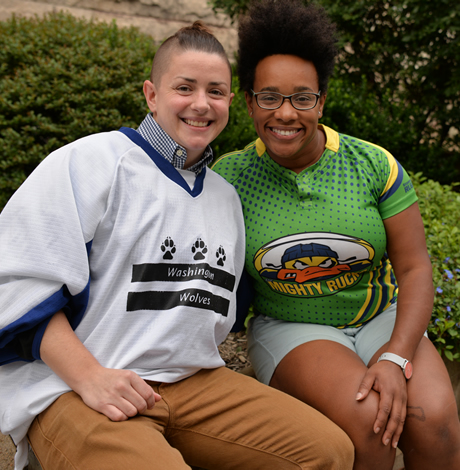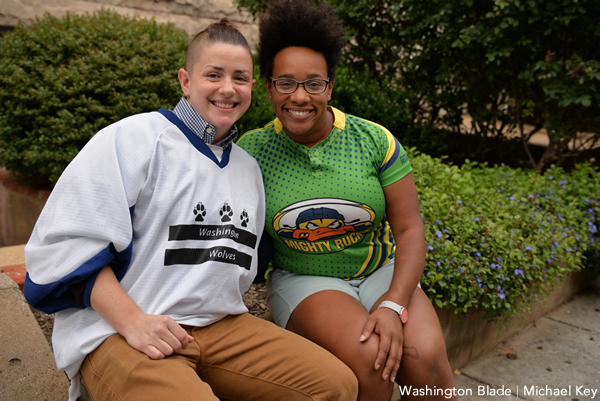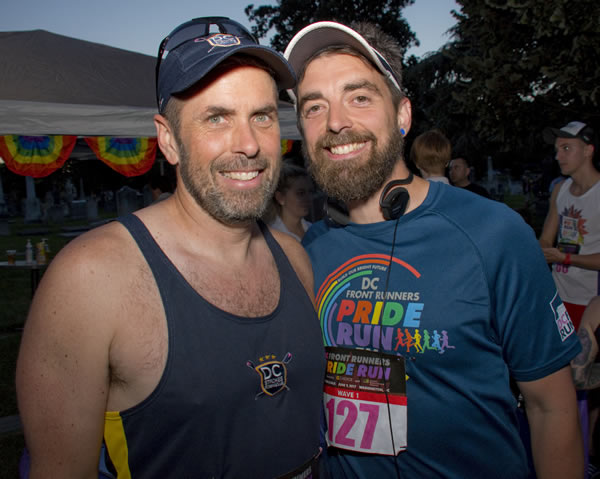Sports
Couples that play together, stay together
Meet locals who mix love and sport


Brigid Beech and Sharifa Love met while playing for the Furies. (Washington Blade photo by Michael Key)
There are a lot of clichés about relationships that people either embrace or avoid.
Love is blind. Opposites attract. It was love at first sight.
What about ‘couples who play together, stay together’?
Meet two LGBT sports couples from D.C. who are carving their own path together by including sports in their relationships.
When Sharifa Love was attending Yale, her roommates were all rugby players and they repeatedly asked her to join their team. Love was busy with other sports and just brushed it aside. It wasn’t until the end of her senior year that they convinced her to come to a rugby practice because they were short a player for an upcoming tournament.
“During a tackle at that first practice, the other girl ended up bleeding and crying,” says Love. “I turned to my new teammates and said, ‘This is the best, I’ll be back.’”
Growing up in Rockville, Love played soccer all the way through high school along with running track. While attending Yale, she ran track for two years and then turned her focus on intramural sports such as squash and ice hockey.
The rugby experience stayed with her after the first tournament and when she returned to the D.C. area after graduation, she looked up adult rugby and joined the DC Furies in 2009.
“I love the physicality and the strategic aspect of the game. Most of my improvement has come from becoming more familiar with tactics,” Love says. “Plus, I just like hitting people; it’s a great outlet.”
Love, who is the development and communications coordinator at SMYAL, is enjoying her life as a rugger. She loves the community aspect and has played all over the country as part of the Women’s Premier League. This November her team will travel to nationals in Phoenix, Ariz.
In 2013, she began dating one of her teammates, Brigid Beech. They had been playing together for the Furies for four years.
Beech arrived in D.C. in 2005 for a job with IBM, consulting with federal clients. It was her first job out of college and as the years passed, she found herself in a rut.
“My life was terrible and I was hating everything,” says Beech. “It finally hit me that I hadn’t played sports in three years, so in 2009 I joined the Furies.”
Born in Ireland, Beech was raised in West Newbury, Mass., and in her first year of high school, she played soccer, basketball and softball. She transferred to a boarding school and changed things up by switching to cross country, ice hockey and lacrosse.
“I really enjoy the culture of team sports,” Beech says. “I have always been the ‘class clown’ and that sense of belonging is important.”
Beech took a gap year and played soccer with a team in Germany while being a part of the Congress-Bundestag Youth Exchange. During her four years at Bates College, she played rugby and captained in her senior year.
Just one year after she started dating Love, Beech would leave the Furies and return to ice hockey playing for the Washington Wolves.
“The level of play and amount of dedication required is very high in rugby,” says Beech. “Picking ice hockey back up is vital to my ability to remember that everything is not about work. I need a healthy outlet and a support system.”
Both women are now playing together again with Rogue Darts while they also maintain their separate sports.
Love said, “We had been friends all along on the Furies, and when we became a couple there was some awkwardness with the team at practices and scrimmages. We didn’t want to show up at practice and be ‘that’ couple.”
Beech replied, “I had dated other players on the team and there is a risk in introducing another layer into a safe space. It becomes high stakes. … It felt super competitive at the beginning. She is so fast and once I caught a piece of her jersey and tackled her out of bounds after the whistle blew. It wasn’t one of my finer moments. She was so pleased that she had gotten me riled up.”
While he was attending Pacific Lutheran University, Ken Kriese was interested in rowing but just couldn’t pull the trigger. He had a physical education requirement and ended up choosing aerobics instead of rowing. Kriese was a military brat growing up and none of the sports he tried, such as soccer and bowling, clicked with him. Born in Tehran, he grew up all over the place but considers Seattle home.
“I spent my junior year of college abroad in England and finally connected with rowing,” says Kriese. “I rowed at Pacific Lutheran for my senior year along with two years while completing my master’s at University of Minnesota.”
Following his doctorate work at the University of California, Davis and a short stint in Memphis, Kriese came to D.C. in 2007 where he works in migratory bird conservation for the U.S. Fish & Wildlife Service. He joined the DC Strokes Rowing Club shortly after arriving.
“Rowing is a natural fit for me because I like the team aspect. You row as a team, you race as a team, and you win as a team,” Kriese says. “DC Strokes has become my circle of friends and family. Because of what I do for a living, it is also appealing to me to be out on the water.”
While he was serving as president of the Strokes in 2015, Kriese met Jeffrey Gonzalez who was serving as the coordinator of the DC Front Runners. The Strokes volunteered at Pride Run 5K and the Front Runners volunteered at Stonewall Regatta. Numbers were exchanged.
Gonzalez moved to the area in 2007 and saw the Front Runners at the Capital Pride parade. He joined the group and has since completed 19 marathons in locations around the world.
His father was in the military and after being born in Colorado, Gonzalez grew up in Fayetteville, N.C., where he didn’t play any sports.
“I was an overweight kid and I started running in the 9th grade and lost a bunch of weight,’ says Gonzalez. “I stuck with running on my own, and ran my first marathon in my senior year of high school.”
After earning degrees at University of North Carolina at Chapel Hill and University of Michigan, Gonzalez works as a division chief at the U.S. Bureau of Labor Statistics and wrapped up his Ph.D. at the University of Maryland.
“I didn’t know anyone when I moved here and it has been great being a part of the Front Runners family,” Gonzalez says.
Kriese had completed a marathon before they met and together they have run marathons across the country. Kriese rowed at the USRowing Masters Nationals last week and both will be running at the Dopey Challenge at Walt Disney World in a few months.
“One of our first dates was a White House tour and we were in the Red Room when the same-sex marriage ruling came through,” said Gonzalez. “I decided to keep dating him even though he was wearing pleated pants.” Gonzalez added, “I am more of a solitary competitive person. He is very competitive. Sometimes I think we are just going out for a casual run, and then he goes balls out. It’s nice to have someone to get you out the door to train though I find myself being mad at him for both sides of that.”
Kriese replied, “Yes, I am a competitive person but I am competing against myself, not him. I have been told not to run faster than him, but I have. If one of us is feeling good, he can take off.”

More than a dozen LGBTQ athletes won medals at the Milan Cortina Winter Olympics that ended on Sunday.
Cayla Barnes, Hilary Knight, and Alex Carpenter are LGBTQ members of the U.S. women’s hockey team that won a gold medal after they defeated Canada in overtime. Knight the day before the Feb. 19 match proposed to her girlfriend, Brittany Bowe, an Olympic speed skater.
French ice dancer Guillaume Cizeron, who is gay, and his partner Laurence Fournier Beaudry won gold. American alpine skier Breezy Johnson, who is bisexual, won gold in the women’s downhill. Amber Glenn, who identifies as bisexual and pansexual, was part of the American figure skating team that won gold in the team event.
Swiss freestyle skier Mathilde Gremaud, who is in a relationship with Vali Höll, an Austrian mountain biker, won gold in women’s freeski slopestyle.
Bruce Mouat, who is the captain of the British curling team that won a silver medal, is gay. Six members of the Canadian women’s hockey team — Emily Clark, Erin Ambrose, Emerance Maschmeyer, Brianne Jenner, Laura Stacey, and Marie-Philip Poulin — that won silver are LGBTQ.
Swedish freestyle skier Sandra Naeslund, who is a lesbian, won a bronze medal in ski cross.
Belgian speed skater Tineke den Dulk, who is bisexual, was part of her country’s mixed 2000-meter relay that won bronze. Canadian ice dancer Paul Poirier, who is gay, and his partner, Piper Gilles, won bronze.
Laura Zimmermann, who is queer, is a member of the Swiss women’s hockey team that won bronze when they defeated Sweden.
Outsports.com notes all of the LGBTQ Olympians who competed at the games and who medaled.
Sports
US wins Olympic gold medal in women’s hockey
Team captain Hilary Knight proposed to girlfriend on Wednesday

The U.S. women’s hockey team on Thursday won a gold medal at the Milan Cortina Winter Olympics.
Team USA defeated Canada 2-1 in overtime. The game took place a day after Team USA captain Hilary Knight proposed to her girlfriend, Brittany Bowe, an Olympic speed skater.
Cayla Barnes and Alex Carpenter — Knight’s teammates — are also LGBTQ. They are among the more than 40 openly LGBTQ athletes who are competing in the games.
The Olympics will end on Sunday.
Sports
Attitude! French ice dancers nail ‘Vogue’ routine
Cizeron and Fournier Beaudry strike a pose in memorable Olympics performance

Madonna’s presence is being felt at the Olympic Games in Italy.
Guillaume Cizeron and his rhythm ice dancing partner Laurence Fournier Beaudry of France performed a flawless skate to Madonna’s “Vogue” and “Rescue Me” on Monday.
The duo scored an impressive 90.18 for their effort, the best score of the night.
“We’ve been working hard the whole season to get over 90, so it was nice to see the score on the screen,” Fournier Beaudry told Olympics.com. “But first of all, just coming out off the ice, we were very happy about what we delivered and the pleasure we had out there. With the energy of the crowd, it was really amazing.”
Watch the routine on YouTube here.





















